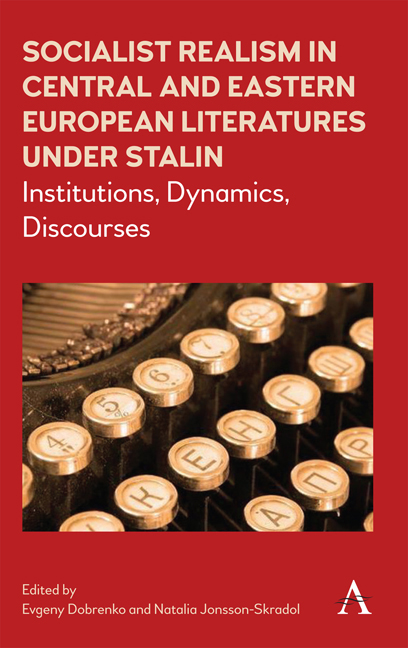 Socialist Realism in Central and Eastern European Literatures under Stalin
Socialist Realism in Central and Eastern European Literatures under Stalin Book contents
- Frontmatter
- Contents
- Acknowledgements
- Introduction
- Part 1 Institutions
- 1 How Socialist Realism Was Exported to Eastern European Countries and How They Got Rid of It
- 2 Literary Monopolists and the Forging of the Post–World War II People's Republic of Letters
- 3 Once Dr Faul Has Left: The Agony of Socialist Realism in Poland, 1955–56
- 4 From Literature Censored by Poets to Literature Censored by the Party: Censorship in the Czech Literary Culture of 1945–55
- 5 The Demise of ‘Socialist Realism for Export’ in 1947: VOKS Receives John Steinbeck and Robert Capa
- 6 The Soviet Factor and the Institutionalization of Bulgarian Literature after World War II
- 7 Cultural Renewal in Eastern Germany – Mission Impossible for Soviet Cultural Officers and German Anti-Fascists?
- Part 2 Dynamics
- Part 3 Discourses
- Conclusion
- List of Contributors
- Index
6 - The Soviet Factor and the Institutionalization of Bulgarian Literature after World War II
from Part 1 - Institutions
Published online by Cambridge University Press: 10 May 2018
- Frontmatter
- Contents
- Acknowledgements
- Introduction
- Part 1 Institutions
- 1 How Socialist Realism Was Exported to Eastern European Countries and How They Got Rid of It
- 2 Literary Monopolists and the Forging of the Post–World War II People's Republic of Letters
- 3 Once Dr Faul Has Left: The Agony of Socialist Realism in Poland, 1955–56
- 4 From Literature Censored by Poets to Literature Censored by the Party: Censorship in the Czech Literary Culture of 1945–55
- 5 The Demise of ‘Socialist Realism for Export’ in 1947: VOKS Receives John Steinbeck and Robert Capa
- 6 The Soviet Factor and the Institutionalization of Bulgarian Literature after World War II
- 7 Cultural Renewal in Eastern Germany – Mission Impossible for Soviet Cultural Officers and German Anti-Fascists?
- Part 2 Dynamics
- Part 3 Discourses
- Conclusion
- List of Contributors
- Index
Summary
The history of introducing Soviet- type political regimes in countries along the European border of the USSR has long been the subject of vehement scholarly and journalistic discussions. Historians still cannot agree on what plan exactly Stalin had in mind for Eastern Europe immediately after the war. Remarkably, Soviet and Western assessments of the post- war situation in the region coincided almost completely. The American diplomat George Kennan compared Eastern Europe in the transitional period between war and peace to a ‘malleable and pliant mass’, while Soviet Foreign Minister Viacheslav Molotov spoke of it being in ‘a liquid state’. There was nothing in these definitions that would make one think of a solid, consistent, well- defined programme for the ‘Sovietization’ of Eastern Europe – apparently simply because there was none, certainly not when it came to cultural policy. Rather, it is more likely that the neighbouring countries were a ‘test ground’ for experimenting with various strategies and methods, various forms of giveand- take, various degrees of enforcement and submission that would, eventually, lead to a status quo that could satisfy all sides involved – or at least leave the weaker ones no choice but to express that they were satisfied.
This chapter focuses on Bulgaria as a case study, the examination of which seems to be especially fruitful for any scholar of contemporary social and cultural European history. On the one hand, insofar as this was a country especially close to the Russian tradition, culturally and politically, it would stand to reason to suppose that the import, or imposition, or copying of Soviet models would be simple and straightforward there. On the other hand, as archival materials clearly show that this was not the case, the very fact that the cultural Sovietization of Bulgaria turned out to be far from straightforward makes one think that, more often than not, the introduction of Soviet (cultural) models was very much a work in progress rather than the result of a realization of a specific plan. The amorphous political state of the region after the war may well have been both a factor that made Sovietization possible in the first place and the reason why Soviet policy was in practice more experimental than it may have seemed in retrospect.
- Type
- Chapter
- Information
- Socialist Realism in Central and Eastern European Literatures under StalinInstitutions, Dynamics, Discourses, pp. 89 - 100Publisher: Anthem PressPrint publication year: 2018
